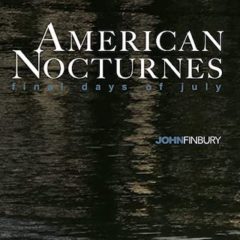 26. AMERICAN NOCTURNES: FINAL DAYS OF JULY, Music composed by John Finbury (Green Flash Music)– The 11 evocative pieces comprising John Finbury’s American Nocturnes: Final Days of July waft dreamlike over a listener’s consciousness, inviting but moody, yet soothing in toto. Finbury himself makes only one appearance on the album, in an impressionistic, dreamlike solo piano turn on the second version of “Waltz for Patty” featured on the album, coming at the end of the journey, with a relatively upbeat ensemble version of the song preceding it by four cuts. Piano is otherwise the province of Tim Ray, an NEA grant recipient, faculty member at the Berklee College of Music and musical director for Tony Bennett. Ray’s elegant touch on the keyboard reveals influences ranging from Dvorak to Debussy to Bill Evans, for starters, and conceptually with composers deeply invested in the beauty of their land and of nature, including Smetana, Aaron Copland, even Randy Newman, and masters of mood such as Henry Mancini and Elmer Bernstein—in fact, “Fantasma,” a richly textured swirl instruments hinting at all sorts of melancholic yearnings, might well have been the great lost track from Bernstein’s To Kill a Mockingbird score, being a seductive wonder of shifting atmospheres fashioned by Finbury’s piano and Eugene Friesen’s cello (Friesen has worked with Dave Brubeck and the Paul Winter Consort, among many others, and has appeared on four Grammy winning recordings) along with Roni Eytan on harmonica (he being the first harmonica player from the Herbie Hancock Institute of Jazz Performance), Claudio Ragazzi on guitar (a Grammy and Emmy winner and has accompanied Yo-Yo Ma, Gary Burton and Paquito D’Rivera, to name a few notables on his resume), Roberto Cassan on accordion (sadly, Cassan, a noted accordionist, composer and teacher, died suddenly after finishing his sessions) and Peter Eldridge on the most fleeting of vocalise parts. The opening track, “Lay Me Down,” opens with a quiet rondo led by piano with harmonica and accordion subtly settling into the mix before receding to make way for a most plaintive and lovely cello solo courtesy Mr. Friesen, with the spirit of Debussy hovering over it all. Give Mr. Finbury credit for being generous in spreading the wealth he has at hand: Friesen has ample room to solo and always delivers the most tender commentary, making his instrument as distinctive a voice as Yo-Yo Ma does his and lending this project untold wealth in its touching expressiveness; “Storybook Ending” is another Friesen showcase but is also a moment for guitarist Ragazzi to enhance the title sentiment, which may well refer to the soul’s exhale at day’s end; on accordion, Vitor Gonçalves (a double Grammy nominee who joined the project following Cassan’s death) sets a thoughtful mood on “My Hometown” ahead of loving, even sentimental (in a good way) reflections shared instrumentally by Finbury, Friesen and Ragazzi in lovely discourse. Though the title sentiment is “Final Days of July,” the grace and subdued temperament of the work as a whole make it the ideal Autumn album as well, inspiring reflection and a refocusing of priorities in the wake of the pandemic Summer of 2020. Beautiful, in all aspects. –David McGee
26. AMERICAN NOCTURNES: FINAL DAYS OF JULY, Music composed by John Finbury (Green Flash Music)– The 11 evocative pieces comprising John Finbury’s American Nocturnes: Final Days of July waft dreamlike over a listener’s consciousness, inviting but moody, yet soothing in toto. Finbury himself makes only one appearance on the album, in an impressionistic, dreamlike solo piano turn on the second version of “Waltz for Patty” featured on the album, coming at the end of the journey, with a relatively upbeat ensemble version of the song preceding it by four cuts. Piano is otherwise the province of Tim Ray, an NEA grant recipient, faculty member at the Berklee College of Music and musical director for Tony Bennett. Ray’s elegant touch on the keyboard reveals influences ranging from Dvorak to Debussy to Bill Evans, for starters, and conceptually with composers deeply invested in the beauty of their land and of nature, including Smetana, Aaron Copland, even Randy Newman, and masters of mood such as Henry Mancini and Elmer Bernstein—in fact, “Fantasma,” a richly textured swirl instruments hinting at all sorts of melancholic yearnings, might well have been the great lost track from Bernstein’s To Kill a Mockingbird score, being a seductive wonder of shifting atmospheres fashioned by Finbury’s piano and Eugene Friesen’s cello (Friesen has worked with Dave Brubeck and the Paul Winter Consort, among many others, and has appeared on four Grammy winning recordings) along with Roni Eytan on harmonica (he being the first harmonica player from the Herbie Hancock Institute of Jazz Performance), Claudio Ragazzi on guitar (a Grammy and Emmy winner and has accompanied Yo-Yo Ma, Gary Burton and Paquito D’Rivera, to name a few notables on his resume), Roberto Cassan on accordion (sadly, Cassan, a noted accordionist, composer and teacher, died suddenly after finishing his sessions) and Peter Eldridge on the most fleeting of vocalise parts. The opening track, “Lay Me Down,” opens with a quiet rondo led by piano with harmonica and accordion subtly settling into the mix before receding to make way for a most plaintive and lovely cello solo courtesy Mr. Friesen, with the spirit of Debussy hovering over it all. Give Mr. Finbury credit for being generous in spreading the wealth he has at hand: Friesen has ample room to solo and always delivers the most tender commentary, making his instrument as distinctive a voice as Yo-Yo Ma does his and lending this project untold wealth in its touching expressiveness; “Storybook Ending” is another Friesen showcase but is also a moment for guitarist Ragazzi to enhance the title sentiment, which may well refer to the soul’s exhale at day’s end; on accordion, Vitor Gonçalves (a double Grammy nominee who joined the project following Cassan’s death) sets a thoughtful mood on “My Hometown” ahead of loving, even sentimental (in a good way) reflections shared instrumentally by Finbury, Friesen and Ragazzi in lovely discourse. Though the title sentiment is “Final Days of July,” the grace and subdued temperament of the work as a whole make it the ideal Autumn album as well, inspiring reflection and a refocusing of priorities in the wake of the pandemic Summer of 2020. Beautiful, in all aspects. –David McGee

‘Fantasma.’ With Tim Ray (piano), Eugene Friesen (cello), Roberto Cassan (accordion) and Peter Eldridge (vocalist), from American Nocturnes: Final Days of July, music composed by John Finbury
***
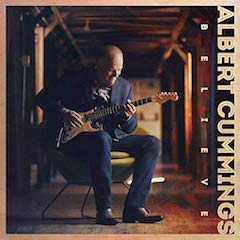 27. BELIEVE, Albert Cummings (Provogue)– Bluesman Albert Cummings has come a long way since introducing himself (and his then-band, Swamp Yankee) in 2000 with a strong debut album, The Long Way. Not the least of his achievements in his career’s early years was making a strong enough impression on the surviving members of Stevie Ray Vaughan’s Double Trouble band—Chris Layton, Tommy Channon and Reese Wynans—as to their support on his 2003 solo debut, From the Heart, marking the first studio sessions the trio had done together since SRV’s passing. A different, and more telling, breakthrough occurred with his self-released 2012 long player No Regrets, wherein he broke out of straight electric blues to explore other roots styles, with a decided country strain showing up in several of the tunes. Although blues remains his foundation, he’s continued to incorporate country and rock into his approach (sometimes within the same song), and an attentive listener can now and then hear remnants of the very young Albert Cummings who at the age of 12 was a neophyte bluegrass banjo student. This eclectic side is on full, glorious display throughout Believe, of which it is not a stretch to declare it this young year’s first outstanding blues album, a tour de force in every respect—vocally, instrumentally, in the quality of its five original songs and in the emotional depth Cummings brings to six cover versions in the way common to all great interpretive singers who make others’ lyrics their own. Follow this link to the full review by David McGee in Deep Roots
27. BELIEVE, Albert Cummings (Provogue)– Bluesman Albert Cummings has come a long way since introducing himself (and his then-band, Swamp Yankee) in 2000 with a strong debut album, The Long Way. Not the least of his achievements in his career’s early years was making a strong enough impression on the surviving members of Stevie Ray Vaughan’s Double Trouble band—Chris Layton, Tommy Channon and Reese Wynans—as to their support on his 2003 solo debut, From the Heart, marking the first studio sessions the trio had done together since SRV’s passing. A different, and more telling, breakthrough occurred with his self-released 2012 long player No Regrets, wherein he broke out of straight electric blues to explore other roots styles, with a decided country strain showing up in several of the tunes. Although blues remains his foundation, he’s continued to incorporate country and rock into his approach (sometimes within the same song), and an attentive listener can now and then hear remnants of the very young Albert Cummings who at the age of 12 was a neophyte bluegrass banjo student. This eclectic side is on full, glorious display throughout Believe, of which it is not a stretch to declare it this young year’s first outstanding blues album, a tour de force in every respect—vocally, instrumentally, in the quality of its five original songs and in the emotional depth Cummings brings to six cover versions in the way common to all great interpretive singers who make others’ lyrics their own. Follow this link to the full review by David McGee in Deep Roots

‘Red Rooster,’ written by Willie Dixon, featured on Albert Cummings’s Believe
***
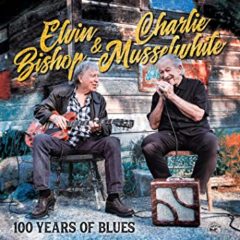 28. 100 YEARS OF BLUES, Elvin Bishop & Charlie Musselwhite (Alligator Records)– Elvin Bishop and Charlie Musselwhite. That’s a match made in blues heaven on earth. The septuagenarians collaborated on a 12-song album, 100 Years of Blues, a statement of their collective music careers. But considering they both started out in Chicago in the early 1960s, they passed the century mark a while ago. As Bishop sings, “We’ve been around since the Dead Sea was sick.” They honed their craft in the same South Side clubs and both moved to Northern California in the late ‘60s but have never made a complete record together until now. They did share some Bay Area fishing holes and the stage during a tour in the 1980s and they cut a song for Elvin Bishop’s Big Fun Trio in 2017 that’s the title track of the new album, 100 Years of Blues. In 2019, Bishop, Musselwhite and guitarist-piano player Bob Welsh played a handful of shows that were so successful they decided to make an album. The full-length CD has a new original, three covers of blues standards, and eight rearrangements of Bishop and Musselwhite’s greatest songs. They don’t have the studio polish of the initial recordings, instead they shine with the most brilliant raw blues you’ve ever heard. Bishop, of course, plays electric guitar and sings in front-porch parlance and Musselwhite blows his deep harmonica and sings with a rich and utterly cool baritone voice. The two interact in a conversational fashion that is natural and casual. Follow this link to the full review by Tim Parsons published at Tahoe Onstage.com.
28. 100 YEARS OF BLUES, Elvin Bishop & Charlie Musselwhite (Alligator Records)– Elvin Bishop and Charlie Musselwhite. That’s a match made in blues heaven on earth. The septuagenarians collaborated on a 12-song album, 100 Years of Blues, a statement of their collective music careers. But considering they both started out in Chicago in the early 1960s, they passed the century mark a while ago. As Bishop sings, “We’ve been around since the Dead Sea was sick.” They honed their craft in the same South Side clubs and both moved to Northern California in the late ‘60s but have never made a complete record together until now. They did share some Bay Area fishing holes and the stage during a tour in the 1980s and they cut a song for Elvin Bishop’s Big Fun Trio in 2017 that’s the title track of the new album, 100 Years of Blues. In 2019, Bishop, Musselwhite and guitarist-piano player Bob Welsh played a handful of shows that were so successful they decided to make an album. The full-length CD has a new original, three covers of blues standards, and eight rearrangements of Bishop and Musselwhite’s greatest songs. They don’t have the studio polish of the initial recordings, instead they shine with the most brilliant raw blues you’ve ever heard. Bishop, of course, plays electric guitar and sings in front-porch parlance and Musselwhite blows his deep harmonica and sings with a rich and utterly cool baritone voice. The two interact in a conversational fashion that is natural and casual. Follow this link to the full review by Tim Parsons published at Tahoe Onstage.com.

‘Old School,’ an Elvin Bishop original, Elvin Bishop & Charlie Musselwhite from 100 Years of Blues
***
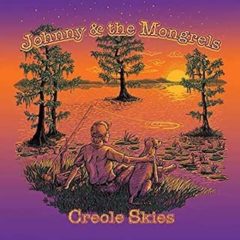 29. CREOLE SKIES, Johnny & The Mongrels (www.johnnyandthemongrels.com) — If you’ve been paying attention over the years, you’ve heard plenty of lyrics referencing New Orleans in all kinds of music. The Crescent City, with a musical history richer than almost any other city in the world, is far and away the most name-checked Louisiana destination, with maybe Baton Rouge a distant second. On their debut album, Creole Skies (the first recordings we’ve heard from the band since its 2016 debut EP, You Ain’t Ready), Johnny & The Mongrels come out of the gate with a funky, swampy bit of southern soul titled “Louisiana Girl” in which songwriters (and band co-founders) Johnny Ryan and Jeff Bostic, teaming with former Gregg Allman Band guitarist Scott Sharrard (who co-produced the disc with JoeBaby at the fabled Dockside Studios in Maurice, LA), get extra points and catch your attention by mentioning not only New Orleans right up front, but in the same verse, in musing over the origins of the title character, speculate on her perhaps being a “New Iberian Queen” or “a pretty girl from Robaline.” Not that I’ve heard every single song about Louisiana that’s ever been written, but I cannot recall any lyric referencing New Iberia or Robaline. Which means nothing if the song containing those citations is unremarkable. In fact, “Louisiana Girl” signals the ascendance of a mighty fine band into the front ranks of chicken-fried southern soul and swamp-rock. Its steady rolling groove, anchored by a solid rhythm section comprised of Bostic on bass and Eddie “the gift that keeps on giving” Christmas on drums as the foundation of a thick rich sound featuring Bill McKay’s tasty keyboard work and Craig Dreyer stepping in with a terrific tenor sax solo, all serving to complement Ryan’s clean, expressive tenor on lead vocal. As the opening track on Creole Skies, it sets the stage perfectly for the pleasures ahead.
29. CREOLE SKIES, Johnny & The Mongrels (www.johnnyandthemongrels.com) — If you’ve been paying attention over the years, you’ve heard plenty of lyrics referencing New Orleans in all kinds of music. The Crescent City, with a musical history richer than almost any other city in the world, is far and away the most name-checked Louisiana destination, with maybe Baton Rouge a distant second. On their debut album, Creole Skies (the first recordings we’ve heard from the band since its 2016 debut EP, You Ain’t Ready), Johnny & The Mongrels come out of the gate with a funky, swampy bit of southern soul titled “Louisiana Girl” in which songwriters (and band co-founders) Johnny Ryan and Jeff Bostic, teaming with former Gregg Allman Band guitarist Scott Sharrard (who co-produced the disc with JoeBaby at the fabled Dockside Studios in Maurice, LA), get extra points and catch your attention by mentioning not only New Orleans right up front, but in the same verse, in musing over the origins of the title character, speculate on her perhaps being a “New Iberian Queen” or “a pretty girl from Robaline.” Not that I’ve heard every single song about Louisiana that’s ever been written, but I cannot recall any lyric referencing New Iberia or Robaline. Which means nothing if the song containing those citations is unremarkable. In fact, “Louisiana Girl” signals the ascendance of a mighty fine band into the front ranks of chicken-fried southern soul and swamp-rock. Its steady rolling groove, anchored by a solid rhythm section comprised of Bostic on bass and Eddie “the gift that keeps on giving” Christmas on drums as the foundation of a thick rich sound featuring Bill McKay’s tasty keyboard work and Craig Dreyer stepping in with a terrific tenor sax solo, all serving to complement Ryan’s clean, expressive tenor on lead vocal. As the opening track on Creole Skies, it sets the stage perfectly for the pleasures ahead.
The band collectively kicks out the jams on the lone cover song here, a furious rock ‘n’ rolling take on Tony Joe White’s “Saturday Night in Oak Grove, LA” complete with a rousing McKay keyboard solo wherein Longhair meets Jerry Lee before Sharrard blows the roof off the sucker with his a merciless red-hot guitar solo. One could go on, but the point is, Johnny & The Mongrels make their presence felt profoundly on Creole Skies. Its strengths are manifold, its music meaningful and built to last, and Ryan as the messenger will not be denied. Creole Skies is operating on a whole different level, at once familiar, fresh and true to the human experience. When they sing and play, and it all comes together, you believe them. What a beautiful thing. Follow this link to the full review by David McGee in Deep Roots.

‘Louisiana Girl,’ the opening track on Johnny & The Mongrels’ Creole Skies
***
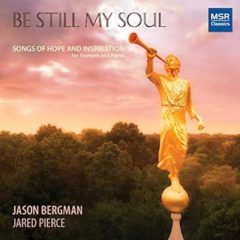 30. BE STILL MY SOUL, Jason Bergman and Jared Pierce (MSR Classics)– If ever there were a time when a recording titled “Songs of Hope and Inspiration” was needed, what better time than the present? Its 14 inspirational and spirituals are drawn both from the ages and from recent sources and all are sensitively, reverently rendered by trumpeter Jason Bergman and pianist Jared Pierce, with some friends pitching in and enhancing the emotional impact on four tunes.
30. BE STILL MY SOUL, Jason Bergman and Jared Pierce (MSR Classics)– If ever there were a time when a recording titled “Songs of Hope and Inspiration” was needed, what better time than the present? Its 14 inspirational and spirituals are drawn both from the ages and from recent sources and all are sensitively, reverently rendered by trumpeter Jason Bergman and pianist Jared Pierce, with some friends pitching in and enhancing the emotional impact on four tunes.
That this is not a rote recital is evident from the first familiar, solemn notes Bergman plays in opening the album with “Amazing Grace.” Working from an arrangement by Kevin McKee, the warmth and plaintiveness Bergman summons from his trumpet approaches heroic proportions, and underneath and in between his passages, Pierce’s spare piano parts, clear and resonant, thoughtfully complement the mood Bergman is establishing. For those who think they know “Amazing Grace” too well to ever be surprised by it, think again. Bergman’s trumpet is the sound of grace achieved; Pierce’s minimalist, probing phrases are the sound of grace sought. The tension these two approaches create reaches critical mass around the halfway mark of the 5:36 performance in a section of new music composed especially for this arrangement in which the instruments reach heavenward. Bergman soars, high and triumphant, weaving an angular, keening melody, as Pierce heads right into the church with a series of assertive rolling figures, setting the stage for Bergman to take the original melody home with an exultant flourish morphing into a warm, comforting coda. This “Amazing Grace” will stay with you a long time by dint of it tapping so deeply into the well of redemption its lyrics celebrate and this instrumental version evokes. Follow this link to the full review, “In The Still of The Night,” by David McGee, in Deep Roots.

‘Amazing Grace,’ Jason Bergman (trumpet) and Jared Pierce (piano), from Be Still My Soul

‘What Sweeter Music,’ composed by John Rutter, performed by Jason Bergman (trumpet), Jared Pierce (piano) and Brian Bowman (euphonium), from Be Still My Soul
***
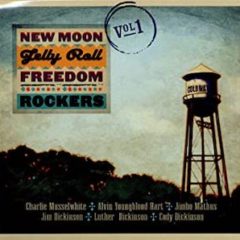 31. NEW MOON JELLYROLL FREEDOM ROCKERS, VOL.1 (Stony Plain)— Roots “supergroup”? You’re right to be suspicious of that over-used marketing term. But in this case, the contributors fit that somewhat pretentious description. The music captured in this ad-hoc, extremely loose-knit recording was created in sessions spread out over a few days in November 2007. Most of the participants (singer/harpist Charlie Musselwhite, singer/songwriter Alvin Youngblood Hart, deep South garage rocker and Squirrel Nut Zipper founder Jimbo Mathus, and North Mississippi Allstars’ Cody and Luther Dickenson with their famous dad Jim) met while touring together. They became fast friends, taking that road energy back to the Dickinson’s Zebra Ranch Recording Studio in Coldwater, Mississippi for a shambolic, sometimes messy but undeniably heartfelt batch of live recordings with no overdubs and seemingly not a lot of rehearsal. The players sat in a circle on the studio floor trading songs, mostly covers with a few originals. The easy-going proceedings were caught on tape but never released…until now.
31. NEW MOON JELLYROLL FREEDOM ROCKERS, VOL.1 (Stony Plain)— Roots “supergroup”? You’re right to be suspicious of that over-used marketing term. But in this case, the contributors fit that somewhat pretentious description. The music captured in this ad-hoc, extremely loose-knit recording was created in sessions spread out over a few days in November 2007. Most of the participants (singer/harpist Charlie Musselwhite, singer/songwriter Alvin Youngblood Hart, deep South garage rocker and Squirrel Nut Zipper founder Jimbo Mathus, and North Mississippi Allstars’ Cody and Luther Dickenson with their famous dad Jim) met while touring together. They became fast friends, taking that road energy back to the Dickinson’s Zebra Ranch Recording Studio in Coldwater, Mississippi for a shambolic, sometimes messy but undeniably heartfelt batch of live recordings with no overdubs and seemingly not a lot of rehearsal. The players sat in a circle on the studio floor trading songs, mostly covers with a few originals. The easy-going proceedings were caught on tape but never released…until now.
Part one (a second album from the same gathering is due in early 2021) finds the guys trading lead vocals on material that ranges from a ragged but fun run through Jimi Hendrix’s “Stone Free” (Hart sings while Musselwhite blows searing harp) to Jim Dickinson shuffling in the saucy, sassy traditional blues of “Come On Down to My House” and Jimbo Mathus strutting with a frisky, slightly risqué “Shake It and Break It.” Hart displays his guitar skills on a down and dirty version of Charlie Patton’s “Pony Blues” and the elder Dickinson chugs into a rollicking “Let’s Work Together.” Musselwhite checks in with two originals, swinging through “Blues Why You Worry Me?” and a rowdy nearly seven minute train-time closing “Strange Land” with Luther whipping off a raw Mike Bloomfield inspired guitar solo on one of the disc’s most electrifying moments. Follow this link to the full review by Hal Horowitz in American Songwriter.

Wilbert Harrison’s ‘Let’s Work Together’ (lead vocal: Jim Dickinson), New Moon Jellyroll Freedom Rockers, Vol. 1

Charlie Patton’s ‘Pony Blues,’ with Alvin Youngblood Hart on lead guitar and vocal from New Moon Jellyroll Freedom Rockers, Vol. 1
***
 32. AERIAL VIEWS, Todd Mosby (MMG Records)– Produced by the legendary Will Ackerman and Tom Eaton team, Aerial Views features a cast of world-class musicians: violinist Charlie Bisharat, bassist Tony Levin, drummer Jerry Marotta, bassist Michael Manring, percussionist Jeff Haynes, multi-instrumentalist Premik Tubbs on soprano and lap steel, Lola Kristine on piano and vocals to name a few. That freedom is evident throughout Aerial Views, the third in a series of concept albums that highlight the natural elements. It follows Eagle Mountain, a tribute to earth, and Open Waters, dedicated to the seas. In conceiving the music for Aerial Views, Mosby focused on strong melody and a unique form of harmony inspired by the Imrat guitar; the bulk of the tracks feature Mosby interacting in instrumental settings with some “A” list, heavy hitting musicians. “I had an abundance of material to pull from,” he says. “Each tune had to survive the production process while remaining engaging enough for each musician to bring their best forward.” Mosby says.
32. AERIAL VIEWS, Todd Mosby (MMG Records)– Produced by the legendary Will Ackerman and Tom Eaton team, Aerial Views features a cast of world-class musicians: violinist Charlie Bisharat, bassist Tony Levin, drummer Jerry Marotta, bassist Michael Manring, percussionist Jeff Haynes, multi-instrumentalist Premik Tubbs on soprano and lap steel, Lola Kristine on piano and vocals to name a few. That freedom is evident throughout Aerial Views, the third in a series of concept albums that highlight the natural elements. It follows Eagle Mountain, a tribute to earth, and Open Waters, dedicated to the seas. In conceiving the music for Aerial Views, Mosby focused on strong melody and a unique form of harmony inspired by the Imrat guitar; the bulk of the tracks feature Mosby interacting in instrumental settings with some “A” list, heavy hitting musicians. “I had an abundance of material to pull from,” he says. “Each tune had to survive the production process while remaining engaging enough for each musician to bring their best forward.” Mosby says.
Produced by the legendary Will Ackerman and Tom Eaton team, Aerial Views takes off with “Gliding,” featuring a cast of world-class musicians: bassist Tony Levin, drummer Jerry Marotta, percussionist Jeff Haynes, multi-instrumentalist Premik Tubbs on soprano saxophone and Eaton playing the Fender Rhodes keyboard. Mosby plays both the standard Gibson ES275 guitar as well as acoustic and electric Imrat guitar, an 18-stringed sitar-guitar hybrid bridge instrument created by Ustadt Imrat Khan, Kim Schwartz and Mosby.
“Across America,” the second track on Aerial Views, introduces the virtuoso violinist Charlie Bisharat, who returns periodically; other contributors on the album include pianist and vocalist Lola Kristine (an up-and-coming young artist and natural in the studio as well as stage) and veteran bassist Michael Manring. Ackerman, the legendary founder of Windham Hill Records and a Grammy-winning guitarist in his own right, contributes acoustic guitar to “Aether,” another standout track, which according to Mosby is a reminiscent rendition of John Coltrane’s “Naima.” Each successive track—bearing titles such as “Blue Horizons,” “Earth & Sky” and “Between the Clouds,” and of course the title track—further expounds on the album’s overt theme, with various combinations of instruments providing the ever-shifting coloration. Follow this link to the full review/interview in Acoustic Review.co.uk.

‘Earth & Sky,’ Todd Mosby, from Aerial Views

‘To The Sky,’ Todd Mosby, from Aerial Views
***
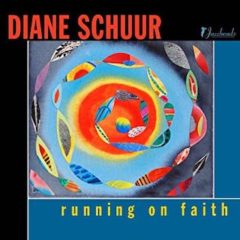 33. RUNNING ON FAITH, Diane Schuur (Jazzheads)– Returning from a six-year sabbatical, Diane Schurr, with Ernie Watts on sax and as co-producer, confidently assays songs by legends on the order of Percy Mayfield (two tunes!), Doc Pomus, Paul Simon, Carole King, Lennon-McCartney, Paul Thorn and Clyde Otis, to name a few, and makes everything memorable. In fine voice (warmer and less reedy in her mature years, less Dinah Washington and more latter-day Peggy Lee in her timbre and delivery) and working in a medium-cool ambiance fashioned by the Watts-led quintet, Schurr leans into her strengths—not explosive vocal displays but rather quiet storms of casual, swinging phrasing and precise enunciation, the better to emphasize the lyrics’ message. A smoky version of Pomus’s “There Is Always One More Time” elicits a lovely vocal, its emotional restraint rendering it all the more deeply felt. This selection resonates by honoring both B.B. King, with whom Schurr recorded a top-charting jazz album, 1994’s Heart to Heart, and a great songwriter whose art was central to two of B.B.’s outstanding ‘80s albums, There Is Always One More Time and There Must Be a Better World Somewhere. Schurr’s ruminative piano enhances a piercing consideration of aging out of romance in Clyde Otis’s classic “This Bitter Earth,” whereas her soulful, spare soloing on “Let It Be” and on a solo piano take of “Swing Low Sweet Chariot” provide spiritual uplift amidst the blues’ harsh reality. –-David McGee
33. RUNNING ON FAITH, Diane Schuur (Jazzheads)– Returning from a six-year sabbatical, Diane Schurr, with Ernie Watts on sax and as co-producer, confidently assays songs by legends on the order of Percy Mayfield (two tunes!), Doc Pomus, Paul Simon, Carole King, Lennon-McCartney, Paul Thorn and Clyde Otis, to name a few, and makes everything memorable. In fine voice (warmer and less reedy in her mature years, less Dinah Washington and more latter-day Peggy Lee in her timbre and delivery) and working in a medium-cool ambiance fashioned by the Watts-led quintet, Schurr leans into her strengths—not explosive vocal displays but rather quiet storms of casual, swinging phrasing and precise enunciation, the better to emphasize the lyrics’ message. A smoky version of Pomus’s “There Is Always One More Time” elicits a lovely vocal, its emotional restraint rendering it all the more deeply felt. This selection resonates by honoring both B.B. King, with whom Schurr recorded a top-charting jazz album, 1994’s Heart to Heart, and a great songwriter whose art was central to two of B.B.’s outstanding ‘80s albums, There Is Always One More Time and There Must Be a Better World Somewhere. Schurr’s ruminative piano enhances a piercing consideration of aging out of romance in Clyde Otis’s classic “This Bitter Earth,” whereas her soulful, spare soloing on “Let It Be” and on a solo piano take of “Swing Low Sweet Chariot” provide spiritual uplift amidst the blues’ harsh reality. –-David McGee
![The Elite Half-Hundred of 2020, Part 2 19 Diane Schuur - There Is Always One More Time [Official Audio]](https://i.ytimg.com/vi/DcVKdrIC34Q/hqdefault.jpg)
Doc Pomus’s ‘There Is Always One More Time,’ Diane Schuur, from Running on Faith
***
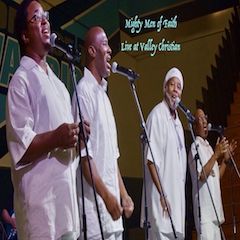 34. LIVE AT VALLEY CHRISTIAN, Mighty Men of Faith (N2L Records)– Live at Valley Christian by the Mighty Men of Faith was recorded in front of 2,400 enthusiastic young students at the Valley Christian School in San Jose, California. Typically, there’s no more critical crowd of listeners than a group of young people, but the Mighty Men of Faith appear to have won them over. The smooth modern quartet brought their friendly and relaxed delivery to the school—-they sound like the Dells singing gospel. The California-based quartet’s music is driven by a rhythm section led by Prince Damon on keyboard. Cierra Davis is on drums, Neil Castro handles lead guitar and Vernon Hall is on bass. Follow this link to the full review by Bob Marovich in Deep Roots…
34. LIVE AT VALLEY CHRISTIAN, Mighty Men of Faith (N2L Records)– Live at Valley Christian by the Mighty Men of Faith was recorded in front of 2,400 enthusiastic young students at the Valley Christian School in San Jose, California. Typically, there’s no more critical crowd of listeners than a group of young people, but the Mighty Men of Faith appear to have won them over. The smooth modern quartet brought their friendly and relaxed delivery to the school—-they sound like the Dells singing gospel. The California-based quartet’s music is driven by a rhythm section led by Prince Damon on keyboard. Cierra Davis is on drums, Neil Castro handles lead guitar and Vernon Hall is on bass. Follow this link to the full review by Bob Marovich in Deep Roots…

‘A Friend of God,’ Mighty Men of Faith, from Live at Valley Christian
***
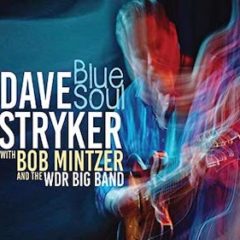 35. BLUE SOUL, Dave Stryker with Bob Mintzer and the WDR Big Band (Strikezone Records)— It’s summertime and guitarist Dave Stryker’s new collaboration with tenor sax man Bob Mintzer and Mintzer’s WDR Big Band takes us back to a time not long removed when the living was easy. Three Stryker originals; a Mintzer-led propulsive workout on the bandleader’s “Aha”; and five not-so-obvious covers that the assembled musicians knock out of the park comprise a wonderful musical outing that serves as a soothing balm during the coronavirus summer of 2020. The Mintzer-led WDR Big Band is simply warm and wonderful throughout, whether keeping a steady, horn-driven groove going on an instrumental version of Marvin Gaye’s “What’s Going On,” as Stryker, complemented by Billy Test’s humming organ, fashions solos—single string runs, 16th-note flurries, long, lean cries—before giving way to a keening alto sax turn by Karolina Strassmeyer; or engaging in a perfectly calibrated dialogue with Stryker’s guitar and laying down a steady backdrop to Mintzer’s robust tenor workout on the album closing treatment of Stanley Turrentine’s “Stan’s Shuffle.” As always, Stryker is a master of tone, texture and feeling, ranging from thoughtfully crafted, thick-noted sorties on his “Came to Believe” to introspective runs given added emotional ballast by octave chording on a captivating take of Jimmy Webb’s “Wichita Lineman.” On a driving version of Prince’s “When Doves Cry,” Stryker’s voice is equal parts octave chords and top strings discourses, whereas on another Marvin Gaye cover, the album opening “Trouble Man,” Stryker, buttressed again by Billy Test’s soulful organ support and striking bursts of horns, shadows the melody line before breaking out in a multi-textured solo almost equal parts cool and restrained and anxious and, well, troubled. With its persistent medium-cool approach, plus enough high-stepping passages in Mintzer’s inspired arrangements to keep the proceedings unpredictable and engaging, Blue Soul immediately occupies the rarified air of a solid seasonal perennial. –David McGee
35. BLUE SOUL, Dave Stryker with Bob Mintzer and the WDR Big Band (Strikezone Records)— It’s summertime and guitarist Dave Stryker’s new collaboration with tenor sax man Bob Mintzer and Mintzer’s WDR Big Band takes us back to a time not long removed when the living was easy. Three Stryker originals; a Mintzer-led propulsive workout on the bandleader’s “Aha”; and five not-so-obvious covers that the assembled musicians knock out of the park comprise a wonderful musical outing that serves as a soothing balm during the coronavirus summer of 2020. The Mintzer-led WDR Big Band is simply warm and wonderful throughout, whether keeping a steady, horn-driven groove going on an instrumental version of Marvin Gaye’s “What’s Going On,” as Stryker, complemented by Billy Test’s humming organ, fashions solos—single string runs, 16th-note flurries, long, lean cries—before giving way to a keening alto sax turn by Karolina Strassmeyer; or engaging in a perfectly calibrated dialogue with Stryker’s guitar and laying down a steady backdrop to Mintzer’s robust tenor workout on the album closing treatment of Stanley Turrentine’s “Stan’s Shuffle.” As always, Stryker is a master of tone, texture and feeling, ranging from thoughtfully crafted, thick-noted sorties on his “Came to Believe” to introspective runs given added emotional ballast by octave chording on a captivating take of Jimmy Webb’s “Wichita Lineman.” On a driving version of Prince’s “When Doves Cry,” Stryker’s voice is equal parts octave chords and top strings discourses, whereas on another Marvin Gaye cover, the album opening “Trouble Man,” Stryker, buttressed again by Billy Test’s soulful organ support and striking bursts of horns, shadows the melody line before breaking out in a multi-textured solo almost equal parts cool and restrained and anxious and, well, troubled. With its persistent medium-cool approach, plus enough high-stepping passages in Mintzer’s inspired arrangements to keep the proceedings unpredictable and engaging, Blue Soul immediately occupies the rarified air of a solid seasonal perennial. –David McGee

‘What’s Going On,’ Dave Stryker with Bob Mintzer and the WDR Big Band, from Blue Soul
***
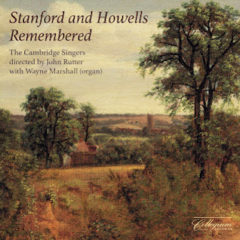 36. STANFORD AND HOWELLS REMEMBERED, The Cambridge Singers, Directed by John Rutter with Wayne Marshall (Organ) (Collegium Records)– This set is a reissue of influential recordings made by John Rutter and the Cambridge Singers in 1992, now expanded with an additional 20 minutes of music not issued on the original disc. The music that Sir Charles Villiers Stanford and Herbert Howells wrote for Anglican services, notably Matins and Evensong, never went away, and the sets of canticles they wrote have been well-loved by generations of church musicians. But there was a tendency to overlook or take it for granted in the wider musical world, and for much of the post-War period, neither composer’s choral output was known well. This recording was part of a valuable re-assessment of both composers’ works. Stanford and Howells Remembered on Collegium Records features John Rutter and the Cambridge Singers with organist Wayne Marshall in Stanford’s Evening Canticles in G, Evening Canticles in B flat, Latin Magnificat, Te Deum in C, When Mary Thro’ the Garden Went, I Heard a Voice From Heaven and O for a Closer Walk, and Howells’ Requiem, Magnificat and Nunc Dimittis from The Gloucester Service, The Fear of the Lord, Like as the Hart, and Long, Long Ago, plus the hymn All My Hope on God is Founded, all recorded in Ely Cathedral in 1992. These performances have stood the test of time. The choir sings with beautiful control and clarity, and also with great love, affection and understanding. Much of the repertoire on these discs has found its way repeatedly into the CD catalogues in the intervening years, but this influential set remains a delightful compilation. Follow this link to the full review by Robert Hugill in Deep Roots.
36. STANFORD AND HOWELLS REMEMBERED, The Cambridge Singers, Directed by John Rutter with Wayne Marshall (Organ) (Collegium Records)– This set is a reissue of influential recordings made by John Rutter and the Cambridge Singers in 1992, now expanded with an additional 20 minutes of music not issued on the original disc. The music that Sir Charles Villiers Stanford and Herbert Howells wrote for Anglican services, notably Matins and Evensong, never went away, and the sets of canticles they wrote have been well-loved by generations of church musicians. But there was a tendency to overlook or take it for granted in the wider musical world, and for much of the post-War period, neither composer’s choral output was known well. This recording was part of a valuable re-assessment of both composers’ works. Stanford and Howells Remembered on Collegium Records features John Rutter and the Cambridge Singers with organist Wayne Marshall in Stanford’s Evening Canticles in G, Evening Canticles in B flat, Latin Magnificat, Te Deum in C, When Mary Thro’ the Garden Went, I Heard a Voice From Heaven and O for a Closer Walk, and Howells’ Requiem, Magnificat and Nunc Dimittis from The Gloucester Service, The Fear of the Lord, Like as the Hart, and Long, Long Ago, plus the hymn All My Hope on God is Founded, all recorded in Ely Cathedral in 1992. These performances have stood the test of time. The choir sings with beautiful control and clarity, and also with great love, affection and understanding. Much of the repertoire on these discs has found its way repeatedly into the CD catalogues in the intervening years, but this influential set remains a delightful compilation. Follow this link to the full review by Robert Hugill in Deep Roots.

‘Requiem: I Heard a Voice from Heaven,’ composed by Charles Villiers Stanford, performed by the Cambridge Singers conducted by John Rutter, with soprano Donna Deam, tenor Andrew Gant, baritone Simon Davies. Recorded in 1992 for the album Stanford and Howells Remembered, now reissued in expanded form by Collegium Records.
***
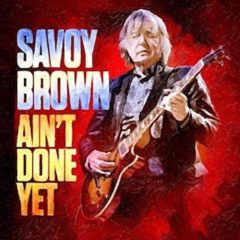 37. AIN’T DONE YET, Savoy Brown (Quarto Valley Records)— Since founding Savoy Brown in 1966, guitarist-singer-songwriter Kim Simmonds has seen an astonishing number of musicians enter and exit the lineup. In 2009, stability arrived in the form of powerhouse rhythm section Pat DeSalvo (bass) and Garnett Grimm (drums). Ensuing years have found the trio fashioning ever more exciting albums, especially the latest, Ain’t Done Yet. In his later years, Simmonds’ voice is a muscular Dylan growl and his guitar playing still inventive, expressive and urgent. The new tunes are lyrically captivating, and he spices the archetypal bare knuckle, bone crushing, pitiless British blues-rock crunch with unusual tones and instruments. Emersonian self-reliance abounds in his lyrical forays, expressed in sinister entreaties in the dirge-like ambiance of “Devil’s Highway” and in aggressive, hard hitting style in the thunderous “All Gone Wrong.’ The title track offers another message of resilience amidst classic, hard driving Savoy Brown boogie, but for a change of pace, consider the affecting country blues atmospherics provided by a steel dobro in “Rocking in Louisiana,” Simmonds’ homage to the music that was the siren call of his youth. Rock on, dude? Kim Simmonds can’t help himself. —David McGee
37. AIN’T DONE YET, Savoy Brown (Quarto Valley Records)— Since founding Savoy Brown in 1966, guitarist-singer-songwriter Kim Simmonds has seen an astonishing number of musicians enter and exit the lineup. In 2009, stability arrived in the form of powerhouse rhythm section Pat DeSalvo (bass) and Garnett Grimm (drums). Ensuing years have found the trio fashioning ever more exciting albums, especially the latest, Ain’t Done Yet. In his later years, Simmonds’ voice is a muscular Dylan growl and his guitar playing still inventive, expressive and urgent. The new tunes are lyrically captivating, and he spices the archetypal bare knuckle, bone crushing, pitiless British blues-rock crunch with unusual tones and instruments. Emersonian self-reliance abounds in his lyrical forays, expressed in sinister entreaties in the dirge-like ambiance of “Devil’s Highway” and in aggressive, hard hitting style in the thunderous “All Gone Wrong.’ The title track offers another message of resilience amidst classic, hard driving Savoy Brown boogie, but for a change of pace, consider the affecting country blues atmospherics provided by a steel dobro in “Rocking in Louisiana,” Simmonds’ homage to the music that was the siren call of his youth. Rock on, dude? Kim Simmonds can’t help himself. —David McGee

‘Rocking in Louisiana,’ Savoy Brown, from Ain’t Done Yet
***
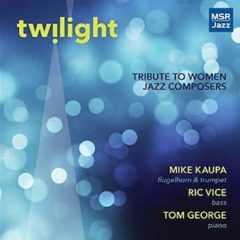 38. TWILIGHT, Mike Kaupa, Ric Vice, Tom George (MSR Jazz)– The best description of Twilight, a project featuring a trio of jazz veterans, would be the title of one of the songs they chose for this project spotlighting women jazz composers, namely “Fine and Mellow,” Billie Holiday’s 1939 jazz standard. Two of the musicians, Mike Kaupa (trumpet and flugelhorn) and Tom George (piano) are not only well-credentialed jazz veterans but also deeply invested in academia: in addition to performing, Kaupa is on the faculties of the Harley School, Finger Lakes Community College and Eastman Community School; George, with a long career performing solo, in combos and with bands here and abroad, was, from 2003 to 2019 (and now emeritus), chancellor and professor of chemistry and physics at the University of Missouri-St. Louis, and as an active researcher in laser/medical/nanophysics has authored seven books, edited 18 books and nearly 800 papers. Based in the St. Louis region, bassist Ric Vice has played with an extensive roster of jazz and cabaret artists over the years, and back in 2010 toured with original Supremes member Mary Wilson. To listeners who find musicians steeped in academia lacking something in unfettered expressiveness or distinctive personality in conception and execution, be advised such concerns do not apply here. Listen to the easygoing rapport between Kaupa’s warm flugelhorn and George’s languid piano on the album opening take on Marian McPartland’s “Twilight World” (lyrics by Johnny Mercer) with its understated hints of the original’s bossa nova beat. McPartland, in addition to being an admired pianist and composer (Duke Ellington was a big fan), and in her later years host of a popular NPR radio show, Marian McPartland’s Piano Jazz, wrote extensively about women in jazz, beginning in the late ‘50s and continuing on into the ‘80s; in 1959, in an article for the British publication Just Jazz, she asked, “Can’t we women make our own contribution to jazz by playing like women, but still capturing the essence of jazz—good beat—good ideas—honesty and true feeling?” In many ways, she’s not only the touchstone for Twilight, but poses the question answered by the empathetic work of the male trio interpreting the works of female writers here. I’m not sure what she meant by “playing like women” but Kaupe, Vice and George certainly do offer a good beat, good ideas, honesty and true feeling in their inspired renditions of 14 songs written or co-written by female songwriters. Follow this link to the full review by David McGee in Deep Roots.
38. TWILIGHT, Mike Kaupa, Ric Vice, Tom George (MSR Jazz)– The best description of Twilight, a project featuring a trio of jazz veterans, would be the title of one of the songs they chose for this project spotlighting women jazz composers, namely “Fine and Mellow,” Billie Holiday’s 1939 jazz standard. Two of the musicians, Mike Kaupa (trumpet and flugelhorn) and Tom George (piano) are not only well-credentialed jazz veterans but also deeply invested in academia: in addition to performing, Kaupa is on the faculties of the Harley School, Finger Lakes Community College and Eastman Community School; George, with a long career performing solo, in combos and with bands here and abroad, was, from 2003 to 2019 (and now emeritus), chancellor and professor of chemistry and physics at the University of Missouri-St. Louis, and as an active researcher in laser/medical/nanophysics has authored seven books, edited 18 books and nearly 800 papers. Based in the St. Louis region, bassist Ric Vice has played with an extensive roster of jazz and cabaret artists over the years, and back in 2010 toured with original Supremes member Mary Wilson. To listeners who find musicians steeped in academia lacking something in unfettered expressiveness or distinctive personality in conception and execution, be advised such concerns do not apply here. Listen to the easygoing rapport between Kaupa’s warm flugelhorn and George’s languid piano on the album opening take on Marian McPartland’s “Twilight World” (lyrics by Johnny Mercer) with its understated hints of the original’s bossa nova beat. McPartland, in addition to being an admired pianist and composer (Duke Ellington was a big fan), and in her later years host of a popular NPR radio show, Marian McPartland’s Piano Jazz, wrote extensively about women in jazz, beginning in the late ‘50s and continuing on into the ‘80s; in 1959, in an article for the British publication Just Jazz, she asked, “Can’t we women make our own contribution to jazz by playing like women, but still capturing the essence of jazz—good beat—good ideas—honesty and true feeling?” In many ways, she’s not only the touchstone for Twilight, but poses the question answered by the empathetic work of the male trio interpreting the works of female writers here. I’m not sure what she meant by “playing like women” but Kaupe, Vice and George certainly do offer a good beat, good ideas, honesty and true feeling in their inspired renditions of 14 songs written or co-written by female songwriters. Follow this link to the full review by David McGee in Deep Roots.

‘Go Away Little Girl,’ written by Carole King and Gerry Goffin, a #1 single for Steve Lawrence in 1962, performed by Mike Kaupa (trumpet), Ric Vice (bass) and Tom George (piano), from the album Twilight
***
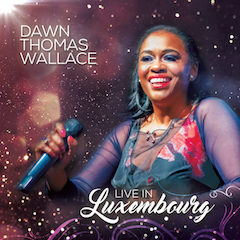 39. LIVE IN LUXEMBOURG, Dawn Thomas Wallace (Zoe Records)– U.K. Christian singer Dawn Thomas Wallace deserves major props for pulling on classics from the contemporary gospel canon for Live in Luxembourg. Recorded before a polite but appreciative audience at Luxembourg’s Oasis Church of God (Pastor Pietro Colaci), Wallace’s release contains material from top-shelf songwriters such as Richard Smallwood, Andrae Crouch, Walter Hawkins, James Cleveland, Travis Greene and William McDowell. It’s a refreshing change from the current trend of writing and recording sound-alike vertical praise anthems. At the same time, the lyrical content of vertical praise, such as the joy that comes from praise and worship, reverberate throughout. The album also demonstrates the love Europe has for the pioneers of contemporary gospel. For example, Wallace and her background vocalists deliver an extended version of the James Cleveland perennial “Jesus Will,” which Cleveland and the Voices of Tabernacle first recorded in 1960 with soprano Hulah Gene Hurley on lead. Wallace and crew, however, borrow Anita Wilson’s recent arrangement for their interpretation. … Some of Wallace’s best singing comes on the opening cut, Richard Smallwood’s “Holy Holy,” and on a number of Andrae Crouch selections, including a medley of Crouch favorites that nearly results in a praise break. Follow this link to the full review by Bob Marovich in Deep Roots
39. LIVE IN LUXEMBOURG, Dawn Thomas Wallace (Zoe Records)– U.K. Christian singer Dawn Thomas Wallace deserves major props for pulling on classics from the contemporary gospel canon for Live in Luxembourg. Recorded before a polite but appreciative audience at Luxembourg’s Oasis Church of God (Pastor Pietro Colaci), Wallace’s release contains material from top-shelf songwriters such as Richard Smallwood, Andrae Crouch, Walter Hawkins, James Cleveland, Travis Greene and William McDowell. It’s a refreshing change from the current trend of writing and recording sound-alike vertical praise anthems. At the same time, the lyrical content of vertical praise, such as the joy that comes from praise and worship, reverberate throughout. The album also demonstrates the love Europe has for the pioneers of contemporary gospel. For example, Wallace and her background vocalists deliver an extended version of the James Cleveland perennial “Jesus Will,” which Cleveland and the Voices of Tabernacle first recorded in 1960 with soprano Hulah Gene Hurley on lead. Wallace and crew, however, borrow Anita Wilson’s recent arrangement for their interpretation. … Some of Wallace’s best singing comes on the opening cut, Richard Smallwood’s “Holy Holy,” and on a number of Andrae Crouch selections, including a medley of Crouch favorites that nearly results in a praise break. Follow this link to the full review by Bob Marovich in Deep Roots

‘We Are Not Ashamed,’ Dawn Thomas Wallace, from Live in Luxembourg
***
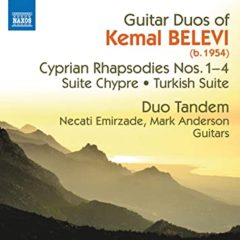 40. GUITAR DUOS OF KEMAL BELEVI, Duo Tandem (Naxos)– I have to confess that until I was sent this disc, I had never come across composer Kemal Belevi, who was born a Turkish Cypriot and trained in London as a guitarist and composer. This disc from Naxos features music for guitar duo by Belevi, performed by Duo Tandem (Necati Emirzade and Mark Anderson). Born in Nicosia, Kemal Belevi started playing guitar in his brother’s band as a teenager but moved to London in 1972 to study music, eventually studying classical guitar and composition (with David McBride, a pupil of Benjamin Britten’s) at the London College of Music. Duo Tandem features London-based Necati Emirzade and Chicago-based Mark Anderson. They formed the duo in 2012 as students at the San Francisco Conservatory of Music. Much of their collaboration is technology-enabled, and they often only meet to perform and record. Guitar Duos of Kemal Beleviis their third disc.We begin with the four delightful Cyprian Rhapsodies, where Belevi uses a variety of guitar textures and the flexibility of two guitarists, to evoke different aspects of Mediterranean rhythms. The rhapsodies were originally written for orchestra, and Belevi made the arrangement for two guitars deliberately to extend the repertoire of music for this combination, and a number of other works on the disc are arrangements. Belevi’s delightful music is evocative of the Eastern Mediterranean. Though he writes using Western classical techniques, many of his modes and rhythms are based on the folk music of Greece, Turkey and the Middle East. Melodies are often evocatively seductive, and at first the music can veer a little close to the holiday souvenir. But look beneath the surface, and this music is carefully and skillfully crafted, and whether writing for guitar duo or arranging for it, Belevi shows himself to be able to use the full range of possibilities of the two instruments. Follow this link to the full review by Robert Hugill in Deep Roots.
40. GUITAR DUOS OF KEMAL BELEVI, Duo Tandem (Naxos)– I have to confess that until I was sent this disc, I had never come across composer Kemal Belevi, who was born a Turkish Cypriot and trained in London as a guitarist and composer. This disc from Naxos features music for guitar duo by Belevi, performed by Duo Tandem (Necati Emirzade and Mark Anderson). Born in Nicosia, Kemal Belevi started playing guitar in his brother’s band as a teenager but moved to London in 1972 to study music, eventually studying classical guitar and composition (with David McBride, a pupil of Benjamin Britten’s) at the London College of Music. Duo Tandem features London-based Necati Emirzade and Chicago-based Mark Anderson. They formed the duo in 2012 as students at the San Francisco Conservatory of Music. Much of their collaboration is technology-enabled, and they often only meet to perform and record. Guitar Duos of Kemal Beleviis their third disc.We begin with the four delightful Cyprian Rhapsodies, where Belevi uses a variety of guitar textures and the flexibility of two guitarists, to evoke different aspects of Mediterranean rhythms. The rhapsodies were originally written for orchestra, and Belevi made the arrangement for two guitars deliberately to extend the repertoire of music for this combination, and a number of other works on the disc are arrangements. Belevi’s delightful music is evocative of the Eastern Mediterranean. Though he writes using Western classical techniques, many of his modes and rhythms are based on the folk music of Greece, Turkey and the Middle East. Melodies are often evocatively seductive, and at first the music can veer a little close to the holiday souvenir. But look beneath the surface, and this music is carefully and skillfully crafted, and whether writing for guitar duo or arranging for it, Belevi shows himself to be able to use the full range of possibilities of the two instruments. Follow this link to the full review by Robert Hugill in Deep Roots.

Cyprian Rhapsody No. 2 (Version for Guitar Duo) by Kemal Belevi, Duo Tandem, from the album Guitar Duos of Kemal Belevi

Romance (Version for Guitar Duo) by Kemal Belevi, Duo Tandem, from the album Guitar Duos of Kemal Belevi
***
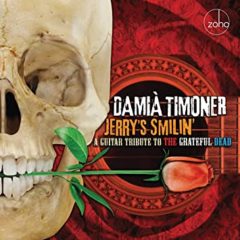 41. JERRY’S SMILIN’: A GUITAR TRIBUTE TO THE GRATEFUL DEAD, Damià Timoner (ZOHO)– Spain-based musician Damià Timoner’s solo acoustic guitar tribute, Jerry’s Smilin’, is a must-hear for both Grateful Dead fans and those who like instrumental nylon-string guitar. Timoner takes 10 Dead tunes and emphasizes sustaining melodies and provides inventive and enjoyable interpretations. Most people who have a passing interest in the Grateful Dead may mistakenly think the group was just a jam band. Deadheads know the Dead had strong melodies and themes in much of their repertoire. That’s the focus of Timoner’s 52-minute album. The intimate, beautiful recording also presents assorted aspects of the Dead’s songwriting, comprising songs penned by various band members and from different eras of the group’s career. While there are some familiar numbers, listeners will also find some tracks which go deeper into the Dead’s catalogue.
41. JERRY’S SMILIN’: A GUITAR TRIBUTE TO THE GRATEFUL DEAD, Damià Timoner (ZOHO)– Spain-based musician Damià Timoner’s solo acoustic guitar tribute, Jerry’s Smilin’, is a must-hear for both Grateful Dead fans and those who like instrumental nylon-string guitar. Timoner takes 10 Dead tunes and emphasizes sustaining melodies and provides inventive and enjoyable interpretations. Most people who have a passing interest in the Grateful Dead may mistakenly think the group was just a jam band. Deadheads know the Dead had strong melodies and themes in much of their repertoire. That’s the focus of Timoner’s 52-minute album. The intimate, beautiful recording also presents assorted aspects of the Dead’s songwriting, comprising songs penned by various band members and from different eras of the group’s career. While there are some familiar numbers, listeners will also find some tracks which go deeper into the Dead’s catalogue.
Timoner commences with the Jerry Garcia/Robert Hunter compositions “Brown-Eyed Women” and “Ramble on Rose,” which are both inspired by versions on the Dead’s triple-album live release Europe ‘72. Timoner changes the key of “Brown-Eyed Women,” which gives Timoner extra liberty and breadth not found in the original; and lets him deliver ruminative inflections which hint at the characterization of the older man at the heart of the song’s lyrics. For “Ramble on Rose” Timoner goes down to a 6th (E) guitar string to furnish some depth on the lower bass parts and adds supplementary timbre which escalates the tale of a woman who travels from place to place.
The outstanding centerpiece is the nine-minute medley, “Lady with a Fan/Terrapin Station,” which are part of a seven-movement suite on 1977’s Terrapin Station. Timoner keeps the original key and impeccably traces up and down his fretboard with tints of Americana folk and jazz. Timoner finishes with three gems. First is the short, bluesy “Operator,” written by Ron “Pigpen” McKernan, which comes from the Dead’s 1971 record American Beauty. Then there’s the piece which made Timoner a Dead devotee, “Dark Star.” Timoner’s nearly six-minute reading is structured on the Dead’s “Dark Star” debut, a 1969 live translation taped at San Francisco’s Fillmore West. Timoner’s soloing during the middle section is superb. Follow this link to the full review by Doug Simpson in Audiophile Audition.

‘Dark Star,’ Damià Timoner, from Jerry’s Smilin’: A Guitar Tribute to the Grateful Dead

‘Ramble on Rose,’ Damià Timoner, from Jerry’s Smilin’: A Guitar Tribute to the Grateful Dead
***
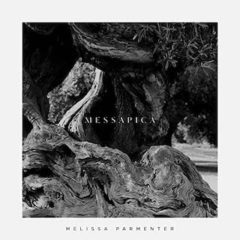 42. MESSAPICA, Melissa Parmenter (Globe Soundtrack and Score)– Melissa Parmenter is something of a polymath, combining careers as film producer and a composer, sometimes overlapping them when she writes film scores. Born in Italy, she moved to England with her family when she was five, first settling in York, then, following another move when she was nine, in Oxford. There she attended the European School and completed the European Baccalaureate. Having a strong interest in dance and choreography, she went from secondary school to the London Contemporary Dance School/The Place, then a year later matriculated to the music program at Durham University. Itas a dominant influence on her new mini album, Messapica, released on Globe Soundtrack and Score, which features eight tracks performed by Parmenter on piano with cellist Harry Escott. The music is often gentle and thoughtful, blending in and out of soundscapes so that the opening “Mezzogiorno” starts with the tolling of a bell and the sounds of a town, and “Bosco Verde” starts with the sound of the sea. Other tracks such as “Martina Franca” include Harry Escott’s soulful cello. Escott is an artist with whom Parmenter has worked before, previously on her 2017 EP Scandinavia. Follow this link to the full review by Robert Hugill in Deep Roots.
42. MESSAPICA, Melissa Parmenter (Globe Soundtrack and Score)– Melissa Parmenter is something of a polymath, combining careers as film producer and a composer, sometimes overlapping them when she writes film scores. Born in Italy, she moved to England with her family when she was five, first settling in York, then, following another move when she was nine, in Oxford. There she attended the European School and completed the European Baccalaureate. Having a strong interest in dance and choreography, she went from secondary school to the London Contemporary Dance School/The Place, then a year later matriculated to the music program at Durham University. Itas a dominant influence on her new mini album, Messapica, released on Globe Soundtrack and Score, which features eight tracks performed by Parmenter on piano with cellist Harry Escott. The music is often gentle and thoughtful, blending in and out of soundscapes so that the opening “Mezzogiorno” starts with the tolling of a bell and the sounds of a town, and “Bosco Verde” starts with the sound of the sea. Other tracks such as “Martina Franca” include Harry Escott’s soulful cello. Escott is an artist with whom Parmenter has worked before, previously on her 2017 EP Scandinavia. Follow this link to the full review by Robert Hugill in Deep Roots.

‘Mezzogiorno,’ Melissa Parmenter, from Messapica
***
 43, DUSTY ROAD, Klezmer-ish (Riverboat Records)– On Dusty Road, Klezmer-ish, four forward-looking classically trained musicians who met as colleagues in the Royal Liverpool Philharmonic Orchestra, burst free from the orchestra’s rigid hierarchy as they explore the music of immigrants from various cultural backgrounds who left their homelands for a different and better life. As their name implies, Klezmer-ish cannot simply be pigeonholed as a straight-ahead klezmer act, but rather presents itself as a band with a diverse and forever expanding repertoire. Bound together in the true spirit of intercultural exchange, their music is always on the move, like the traveling peoples it reflects. As Connie Del Vecchio, the band’s accordionist and violinist, points out, “These peoples took their musical traditions with them and as much as they influenced the music scene wherever they settled, so was their music influenced by the cultures they encountered in their new-found homes. Klezmer music of Jewish immigrants, tangos by Piazzolla (who grew up in Argentina as a son of Italian immigrants) or the gypsy jazz of Stéphane Grappelli and Django Reinhardt–the fantastic collaboration of a classically trained French/Italian violinist with a self-taught gypsy guitarist–are all examples of amazing musical fusions.”
43, DUSTY ROAD, Klezmer-ish (Riverboat Records)– On Dusty Road, Klezmer-ish, four forward-looking classically trained musicians who met as colleagues in the Royal Liverpool Philharmonic Orchestra, burst free from the orchestra’s rigid hierarchy as they explore the music of immigrants from various cultural backgrounds who left their homelands for a different and better life. As their name implies, Klezmer-ish cannot simply be pigeonholed as a straight-ahead klezmer act, but rather presents itself as a band with a diverse and forever expanding repertoire. Bound together in the true spirit of intercultural exchange, their music is always on the move, like the traveling peoples it reflects. As Connie Del Vecchio, the band’s accordionist and violinist, points out, “These peoples took their musical traditions with them and as much as they influenced the music scene wherever they settled, so was their music influenced by the cultures they encountered in their new-found homes. Klezmer music of Jewish immigrants, tangos by Piazzolla (who grew up in Argentina as a son of Italian immigrants) or the gypsy jazz of Stéphane Grappelli and Django Reinhardt–the fantastic collaboration of a classically trained French/Italian violinist with a self-taught gypsy guitarist–are all examples of amazing musical fusions.”
What makes Klezmer-ish so special is their passion for exploring exciting new areas while retaining the grounded excellence of their rigorous training as classical musicians. Still the band plays with a palpable sense of freedom: they’re not aiming for perfect renditions of the originals or trying to play in an “authentic” style, but rather tailoring these pieces to their own personal taste and giving them their own unique twist. As clarinetist Tom Verity explains, “In Klezmer-ish we draw on different repertoires from around the world for our raw ingredients and mix these with our own individual musical interests and influences, to create something new which strikes a chord with us personally and with our audience.” This approach is clear in the band’s playful take on traditional tune “Hershel,” which makes a nod to influences ranging from Renaissance-inspired viol music to punk and plenty in between. Follow this link to the full review in the Border Crossings department in Deep Roots.

‘Volver,’ a tango introduced in 1934, written by Carlos Gardel and Alfredo Le Pera, in Klezmer-ish style from Dusty Road
***
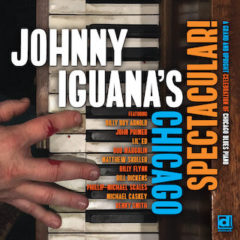 44. JOHNNY IGUANA’S CHICAGO SPECTACULAR!, Johnny Iguana (Delmark Records)— Keyboard player Johnny Iguana is a rare talent in the world of modern blues, fully capable of carrying forward the tradition of Sunnyland Slim and Otis Spann one moment before switching gears in a contemporary manner, incorporating jazz and more, as he takes the music in a clever new direction while never losing touch with the foundation on which everything is based. A 26-year veteran of the Chicago music scene, Johnny debuts as a headliner under his own name for the first time here, but make no mistake about it: he’s been a polished diamond hiding in plain sight for far too long. If you have any doubt, check out the all-star talent he enlisted for this project: John Primer, Bob Margolin, Billy Flynn, Billy Boy Arnold and Lil’ Ed Williams just to name a few. Add Matthew Skoller, Kenny “Beedy Eyes” Smith and world-class bassist Bill “The Buddha” Dickens (Grover Washington Jr., Pat Metheny) to the mix and the results are nothing short of spectacular as the title suggests. The opener, a cover of the Roosevelt Sykes barrelhouse-style standard, “44 Blues,” is right in your old-school comfort zone. It features Johnny’s double-fisted work on the keys with Primer’s strong vocals and tasty licks from Margolin on guitar. Iguana’s brief, tasty solo mid-tune shows he means business, but only hints at what he’s about. The original instrumental, “Hammer and Tickle,” picks up with much the same feel before Johnny’s modern approach rises to the surface through his powerful chordal attack in a jazz trio format–a go-to structure on multiple songs that follow.
44. JOHNNY IGUANA’S CHICAGO SPECTACULAR!, Johnny Iguana (Delmark Records)— Keyboard player Johnny Iguana is a rare talent in the world of modern blues, fully capable of carrying forward the tradition of Sunnyland Slim and Otis Spann one moment before switching gears in a contemporary manner, incorporating jazz and more, as he takes the music in a clever new direction while never losing touch with the foundation on which everything is based. A 26-year veteran of the Chicago music scene, Johnny debuts as a headliner under his own name for the first time here, but make no mistake about it: he’s been a polished diamond hiding in plain sight for far too long. If you have any doubt, check out the all-star talent he enlisted for this project: John Primer, Bob Margolin, Billy Flynn, Billy Boy Arnold and Lil’ Ed Williams just to name a few. Add Matthew Skoller, Kenny “Beedy Eyes” Smith and world-class bassist Bill “The Buddha” Dickens (Grover Washington Jr., Pat Metheny) to the mix and the results are nothing short of spectacular as the title suggests. The opener, a cover of the Roosevelt Sykes barrelhouse-style standard, “44 Blues,” is right in your old-school comfort zone. It features Johnny’s double-fisted work on the keys with Primer’s strong vocals and tasty licks from Margolin on guitar. Iguana’s brief, tasty solo mid-tune shows he means business, but only hints at what he’s about. The original instrumental, “Hammer and Tickle,” picks up with much the same feel before Johnny’s modern approach rises to the surface through his powerful chordal attack in a jazz trio format–a go-to structure on multiple songs that follow.
Johnny revisits the blues root next for a pair of covers. Willie Dixon’s “Down in the Bottom” features Primer on six-string before Sonny Boy Williamson I’s “You’re an Old Lady,” swings from the jump aided by Arnold, who doubles on harp and vocals backed by Flynn and Smith. But Iguana blasts back into the 21st century, melding blues and jazz for the blazing fast, stop-time “Land of Precisely Three Dances,” an original that provides him plenty of space to work out. Follow this link to the full review by Marty Gunther in Chicago Blues Guide.

’44 Blues,’ Roosevelt Sykes’s barrelhouse-style standard, performed by Johnny Iguana (piano) with vocal by John Primer, on Johnny Iguana’s Chicago Spectacular!

‘Land or Precisely Three Dances,’ a Johnny Iguana original from Johnny Iguana’s Chicago Spectacular!
***
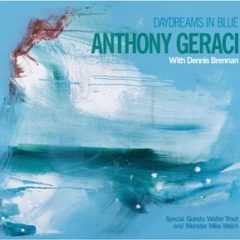 45. DAYDREAMS IN BLUE, Anthony Geraci with Dennis Brennan (Shining Stone Records)– In no way does the serene, Impressionist cover art on Anthony Geraci’s new Daydreams In Bluealbum prepare a listener for the near-unrelenting heat the pianist-songwriter and his bandmates bring to bear on the proceedings within. Whether the occasion is one of harsh, Latin-flavored introspection on “Daydreams of a Broken Fool” or that of a Homeric cry of serial betrayals revealed in the sinister grind-and-stomp of “No One Hears My Prayers” or a lowdown recollection of the haunting memory of fleeting passion in “Living in The Shadow of the Blues,” Geraci’s evocative piano work, underpinned by the solid rhythm section of acoustic bassist Michael Mudcat Ward and drummer Jeff Armstrong, speaks volumes about the issues at hand. He becomes a formidable second voice to the gritty vocals of Boston blues icon Dennis Brennan (who doubles on harmonica and makes you feel, down deep, every note he plays and sings) and a complement to the electrifying guitars of guests Monster Mike Welch (on eight of the dozen tracks) and Walter Trout (that’s him piercing the sky with his plaintive, protesting solo for the ages punctuating the maelstrom created by Geraci’s piano and the surging horns of Scott Arruda and Mark Early on “No One Hears My Prayers”).
45. DAYDREAMS IN BLUE, Anthony Geraci with Dennis Brennan (Shining Stone Records)– In no way does the serene, Impressionist cover art on Anthony Geraci’s new Daydreams In Bluealbum prepare a listener for the near-unrelenting heat the pianist-songwriter and his bandmates bring to bear on the proceedings within. Whether the occasion is one of harsh, Latin-flavored introspection on “Daydreams of a Broken Fool” or that of a Homeric cry of serial betrayals revealed in the sinister grind-and-stomp of “No One Hears My Prayers” or a lowdown recollection of the haunting memory of fleeting passion in “Living in The Shadow of the Blues,” Geraci’s evocative piano work, underpinned by the solid rhythm section of acoustic bassist Michael Mudcat Ward and drummer Jeff Armstrong, speaks volumes about the issues at hand. He becomes a formidable second voice to the gritty vocals of Boston blues icon Dennis Brennan (who doubles on harmonica and makes you feel, down deep, every note he plays and sings) and a complement to the electrifying guitars of guests Monster Mike Welch (on eight of the dozen tracks) and Walter Trout (that’s him piercing the sky with his plaintive, protesting solo for the ages punctuating the maelstrom created by Geraci’s piano and the surging horns of Scott Arruda and Mark Early on “No One Hears My Prayers”).
Heartbreak comes in many forms here, as you can see, and death rears its harrowing head from time to time as well. As per the latter, consider the slow, grinding blues of “Dead Man’s Shoes” (wherein the lyric “the heel is high, but the sole is worn through” ranks as a classic metaphorical state-of-one-man’s-union statement if ever there was one), which mostly asks the rhetorical question, “What kind of man would wear these shoes/dead man’s shoes,” and wonders if the deceased owner was someone of wealth and privilege or a humble, self-denying soul on a spiritual journey (the tale is spiked with Troy Gonyea’s searing guitar solo, as fine and affecting a solo as can be found anywhere on Daydreams in Blue); in “Hard to Say I Love You” (“when I’m six feet in the ground,” Brennan adds), a casually swinging groove of a tune allowing Geraci room for an expansive piano solo and Brennan casually accepting the fate he sings of at the outset in a narrative quite at odds with the track’s upbeat tenor until the final minute or so, when the band elevates the intensity level a few degrees and Brennan rages vocally with, “I’m going back home, where the shepherd tends his sheep/I’ve waited so long/Lord, took my soul to keep—hey!/Took my soul, took my soul…” and completely turns the story inside out and takes it to a darker place; and in the mean woman blues of “Crazy Blues-Mississippi Woman,” featuring a searing lead solo by Monster Mike Welch and a down-and-out, broken-hearted discourse on lethal solitude that finds the protagonist walking around a house devoid of all pleasures, of the flesh and otherwise, before concluding, “I guess I’ll keep on walking/until I walk myself to death.” After all this, Geraci closes the proceedings with a cool trio instrumental, “Ode to Todd, Ella and Mike Ledbetter,” three departed friends of the artist, apparently, who are remembered in song with this 1:12 bright, upbeat sign-off, Geraci’s fingers skipping nimbly across the keys with Ward and Armstrong lending subdued rhythmic support—a soothing exit from the tumult preceding it, completely worthy of the calming cover art, in fact. Nice touch. –David McGee

‘No One Hears My Prayers,’ Anthony Geraci with Dennis Brennan (featuring Walter Trout on guitar), from Daydreams in Blue
***
 46. ERICA REED, Erica Reed (www.ericareedmusic.com)– On her new, self-titled album, the St. Louis-based singer-songwriter Erica Reed journeys into new production territory. For example, atmospheric electronica and 808 beats propel several selections, such as “Enough,” where Reed testifies about Jesus’s ability to heal suffering. “Get Up” is a call to celebrate and dance out our differences and divisions rather than ruminate on them. The sunny “New Day” weaves its call to discipleship in ‘80s Madonna-like snappiness. On the other hand, “Sorry,” with its heartbeat rhythm, has a small combo sound, a memorable melody and lyrics that hint at a fascinating story behind the song. It evokes the pop sensibility of Reed’s magnum opus, “Never Let Go,” from her 2011 album, Sold Out. The current single, “Standing at the Gates,” released last year, is the album’s best musical moment. To a warbling organ and electric guitar, Reed pleads with the passion of a church singer for the gates of Heaven to open. Here, more than anywhere else on the album, you can feel her lifelong relationship with the Baptist church come to full flower. Follow this link to the full review by Bob Marovich in Deep Roots.
46. ERICA REED, Erica Reed (www.ericareedmusic.com)– On her new, self-titled album, the St. Louis-based singer-songwriter Erica Reed journeys into new production territory. For example, atmospheric electronica and 808 beats propel several selections, such as “Enough,” where Reed testifies about Jesus’s ability to heal suffering. “Get Up” is a call to celebrate and dance out our differences and divisions rather than ruminate on them. The sunny “New Day” weaves its call to discipleship in ‘80s Madonna-like snappiness. On the other hand, “Sorry,” with its heartbeat rhythm, has a small combo sound, a memorable melody and lyrics that hint at a fascinating story behind the song. It evokes the pop sensibility of Reed’s magnum opus, “Never Let Go,” from her 2011 album, Sold Out. The current single, “Standing at the Gates,” released last year, is the album’s best musical moment. To a warbling organ and electric guitar, Reed pleads with the passion of a church singer for the gates of Heaven to open. Here, more than anywhere else on the album, you can feel her lifelong relationship with the Baptist church come to full flower. Follow this link to the full review by Bob Marovich in Deep Roots.

‘Sorry,’ Erica Reed from her self-titled album
***
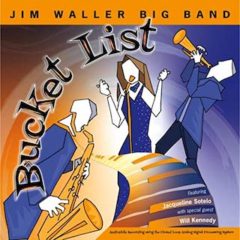 47. BUCKET LIST, Jim Waller Big Band (Jim Waller)– One glance at Jim Waller’s silver mane is enough to make it clear he is no young lion. In fact, Waller, a veteran composer, arranger and multi-instrumentalist who calls San Antonio, Texas, home, is nearing his eighth decade. Even though Waller’s career has been long and successful, there was one item on his Bucket List that hadn’t been crossed off—until now. Waller wanted to lead and record a big band of his own. And so he has. It is a splendid band too, securely anchored by guest drummer Will Kennedy (formerly of the Yellowjackets) and enhanced by Waller’s sunny arrangements, animated solos and seven of his original compositions.
47. BUCKET LIST, Jim Waller Big Band (Jim Waller)– One glance at Jim Waller’s silver mane is enough to make it clear he is no young lion. In fact, Waller, a veteran composer, arranger and multi-instrumentalist who calls San Antonio, Texas, home, is nearing his eighth decade. Even though Waller’s career has been long and successful, there was one item on his Bucket List that hadn’t been crossed off—until now. Waller wanted to lead and record a big band of his own. And so he has. It is a splendid band too, securely anchored by guest drummer Will Kennedy (formerly of the Yellowjackets) and enhanced by Waller’s sunny arrangements, animated solos and seven of his original compositions.
As if to show that nothing is beyond the pale, Waller has even updated George Gershwin’s classic “Rhapsody in Blue,” which helped usher in the era of modern jazz when introduced by Paul Whiteman’s orchestra in 1924 (with the composer at the piano), using a six-member string section to deepen the mood. Waller solos on tenor sax on nine numbers, organ on the well-named “Funksuite 109,” soprano sax on “This Is It.” On tenor, his style leans more toward Georgie Auld or Charlie Ventura than, say, Jimmy Heath or George Coleman. There are five vocals by Jacqueline Sotelo who skims through them without ruffling any feathers or turning any heads. Of the five, two were associated with Peggy Lee (“I Love Being Here with You,” “Why Don’t You Do Right”) and one with Ray Charles (“Georgia on My Mind”).
While the charts for Sotelo are admirable, it is on the nine instrumentals that the band really shines, starting with Waller’s rhythmically impressive “Samba for Suzell” (written for his late wife), and continuing with the emphatic “New Blue Funk” (Bill King, flute) and shuffling “Blues for Los Blues,” a jazz-rock group with whom Waller played in the late ’60s and early ’70s. Follow this link to the full review by Jack Bowers in All About Jazz.com.

Bill Doggett’s ‘Honky Tonk,’ Jim Waller Big Band, from Bucket List
***
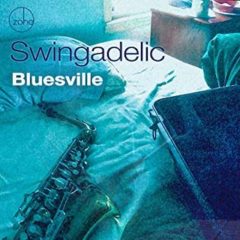 48. BLUESVILLE, Swingadelic (Zoho)—Keeping things swinging with a collection of tunes that “evoke a blues attitude,” as producer-arranger Dave Post writes in his informative liner notes, the Swingadelic big band romps through tunes from the ‘20s through the ‘60s, covering everything from Chicago blues, Kansas City blues, Mississippi-by-way-of-Chicago blues, straight-ahead jazz, classic R&B and some big band chestnuts of yore. For years now, Swingadelic, with its rotating cast of musicians, has held forth on Monday night at Times Square’s Swing 46 dinner/dance venue, and to the regulars there, this long player is a reminder of what once was and shall be again when the coast is clear as well as being a terrific introduction for newcomers to the band’s style.
48. BLUESVILLE, Swingadelic (Zoho)—Keeping things swinging with a collection of tunes that “evoke a blues attitude,” as producer-arranger Dave Post writes in his informative liner notes, the Swingadelic big band romps through tunes from the ‘20s through the ‘60s, covering everything from Chicago blues, Kansas City blues, Mississippi-by-way-of-Chicago blues, straight-ahead jazz, classic R&B and some big band chestnuts of yore. For years now, Swingadelic, with its rotating cast of musicians, has held forth on Monday night at Times Square’s Swing 46 dinner/dance venue, and to the regulars there, this long player is a reminder of what once was and shall be again when the coast is clear as well as being a terrific introduction for newcomers to the band’s style.
Players and vocalist alike shine throughout Bluesville: the Doc Pomus-penned R&B hit for Ray Charles, “Lonely Avenue,” features both an intense John Bauers vocal, a burning sax solo by John DiSanto and some atmospheric, McGriff-redolent organ from Kyle Koehler. Speaking of McGriff and Koehler, the latter sets a spirited pace on a rocking instrumental, “Riffin on McGriff’s,” written by Dave Post and guitarist Andy Riedel, who dazzles with sizzling guitar work in a tasty B.B. King style as the tune settles into its driving pace before the horn section takes the baton and sprints towards the big, blaring finish. Cooling things down, Swingadelic settles gracefully into the slow, melancholy blues of “Fool’s Paradise,” familiar to some from Charles Brown’s lowdown treatment in 1955 after its initial recording by Johnny Fuller, with Sam Cooke delivering a powerful treatment on his 1963 Night Beat album, and Mose Allison giving it his unique spin on Mose Alive! In ‘65. Here, John Bauers takes his cue from the slow boiling self-laceration Mr. Brown performed in ’55 and does a terrific mea culpa confessional with support from a spare, seething arrangement and complementary soloing from alto sax man Ken Robinson and trombonist Rob Edwards. Follow this link to the full review by David McGee in Deep Roots.

‘Parchman Farm,’ the Mose Allison classic featured on Swingadelic’s Bluesville, with guest Mitch Woods on lead vocal and piano and Andy Riedel on guitar
***
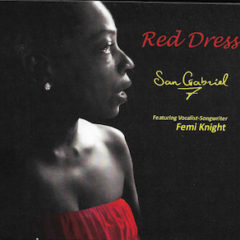 49. RED DRESS, San Gabriel 7 featuring Vocalist/Songwriter Femi Knight (Jrl Sgs)– What would Tower of Power sound like if we swapped out Lenny Williams for Femi Knight and added a teaspoon of the Jazz Crusaders? Obviously, we’ll never know, but the San Gabriel 7’s new album, Red Dress (Jrl Sgs), with singer-songwriter Femi Knight, gives us an idea. The SG7 is based in the Los Angeles area, and Red Dress is the group’s 10th album. The band features two distinct components—a funky rhythm section and a robust squad of horns. On varying tracks, the band features Chad Edwards (keyboards, organ), Matt Weisberg (keyboards), Chris Gordon (piano, background vocals), Steve Gregory (guitar), Jonathan Pintoff (bass), Randy Drake (drums) and Scott Breadman (percussion) with Mike McGuffey (tp), Jeff Jarvis (tp, flhn), Kyle Palmer (tp), Glen Berger (ts,as) and Jim Lewis (tb).
49. RED DRESS, San Gabriel 7 featuring Vocalist/Songwriter Femi Knight (Jrl Sgs)– What would Tower of Power sound like if we swapped out Lenny Williams for Femi Knight and added a teaspoon of the Jazz Crusaders? Obviously, we’ll never know, but the San Gabriel 7’s new album, Red Dress (Jrl Sgs), with singer-songwriter Femi Knight, gives us an idea. The SG7 is based in the Los Angeles area, and Red Dress is the group’s 10th album. The band features two distinct components—a funky rhythm section and a robust squad of horns. On varying tracks, the band features Chad Edwards (keyboards, organ), Matt Weisberg (keyboards), Chris Gordon (piano, background vocals), Steve Gregory (guitar), Jonathan Pintoff (bass), Randy Drake (drums) and Scott Breadman (percussion) with Mike McGuffey (tp), Jeff Jarvis (tp, flhn), Kyle Palmer (tp), Glen Berger (ts,as) and Jim Lewis (tb).
Knight’s songwriting is top notch. So are her vocals, both as lead and overdubbed harmony on backup. She pulls from ’70s soul but keeps her lyrics and feel here and now. Cushman’s arrangements are taut and punchy, also with a ’70s sensibility. Back then, horn charts added zippy hipness in all the right places rather than flooding the zone. The rhythm section is solid, especially Gregory’s guitar, which often plays off the horns. Follow this link to the full by Marc Myers at www.jazzwax.com.

‘I’m Going Home Tonight,’ San Gabriel 7 featuring Femi Knight, from Red Dress
***
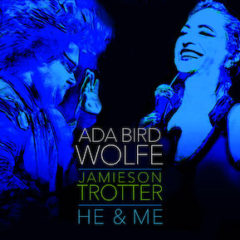 50. HE & ME, Ada Bird Wolfe and Jamieson Trotter (Self-released)— Ada Bird Wolfe’s 2018 debut CD, Birdie (Self Produced), was one of the best recordings released that year. For Wolfe, music has been a lifetime love, even while in school and after, working in business, and writing full time. Wolfe has sojourned from the East to the West Coast, where she finally landed, set down roots and, in 2010, began devoting herself to singing and music full time. … It was there she began to work with pianist and arranger alchemist Jamieson Trotter and the two reached a creative critical mass. …
50. HE & ME, Ada Bird Wolfe and Jamieson Trotter (Self-released)— Ada Bird Wolfe’s 2018 debut CD, Birdie (Self Produced), was one of the best recordings released that year. For Wolfe, music has been a lifetime love, even while in school and after, working in business, and writing full time. Wolfe has sojourned from the East to the West Coast, where she finally landed, set down roots and, in 2010, began devoting herself to singing and music full time. … It was there she began to work with pianist and arranger alchemist Jamieson Trotter and the two reached a creative critical mass. …
On He & Me this creative pair takes a handful of craggy bop tunes, stirring in some tasteful originals, resulting in an even dozen songs for a solid duo recital. Proving the point on a single composition, Wolfe pens words to Wayne Shorter’s 1965 composition “E.S.P.,” resulting in the angular “Mind to Mind,” on which Trotter adds staccato punctuation to the singer’s telepathic words. The pair drops back 20 years to the heyday of bebop and the Dizzy Gillespie/Charlie Parker thunderbolt “Night in Tunisia.” Trotter only approximates the introductory bass line, while Wolfe, in her seasoned and sensual alto voice, singing Frank Paparelli’s lyrics, plumbs the song as a ballad rather than a bop firebrand.
Wolfe’s single ballad standard performance, “But Beautiful,” demonstrates why this is the favorite ballad vehicle for many saxophone players (e.g., Art Pepper). Her laconic delivery melds warmly with the Johnny Burke lyrics. If Wolfe’s organic sensibility on “Any Woman’s Blues” is a hard sell, her “Get It Straight (Straight No Chaser) is humid and fecund, delivered with a rat-a-tat-tat machine gun burst brimming with confidence and aplomb. He & Me proves itself a worthy follow-up to Birdie. Follow this link to the full review by C. Michael Bailey in All About Jazz.

‘But Beautiful,’ written by Jimmy Van Heusen, performed by Ada Bird Wolfe and Jamieson Trotter on He & Me
Follow this link to The Elite Half-Hundred of 2020, Part 1
Follow this link to Albums of the Year 2020

